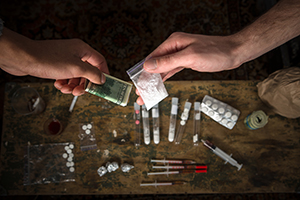Connecticut General Statutes § 21a-277: Sale of Narcotics
 Connecticut General Statutes § 21a-277 makes it a felony to sell, distribute, dispense, or possess with intent to sell any narcotic substance. Unlike C.G.S. § 21a-278, this statute does not require the state to prove that the accused was “non-drug-dependent,” which often makes it a preferred charge for prosecutors.
Connecticut General Statutes § 21a-277 makes it a felony to sell, distribute, dispense, or possess with intent to sell any narcotic substance. Unlike C.G.S. § 21a-278, this statute does not require the state to prove that the accused was “non-drug-dependent,” which often makes it a preferred charge for prosecutors.
The statute applies broadly, covering heroin, cocaine, fentanyl, and other controlled substances. While intended to target mid- and high-level dealers, many individuals charged under § 21a-277 are small-scale users accused of selling or merely possessing amounts deemed “too much for personal use.”
Elements of the CrimeTo convict under C.G.S. § 21a-277, the state must prove beyond a reasonable doubt that:
- The substance was a narcotic drug.
– Includes heroin, cocaine, crack cocaine, fentanyl, and other Schedule I or II narcotics. - The defendant knowingly possessed or controlled the narcotic.
– Knowledge can be actual possession or constructive control over where the narcotics were located. - The defendant sold, dispensed, gave, or intended to sell the narcotic.
– “Sale” is defined broadly to include delivery, exchange, or transfer, even without money changing hands.
- Traffic Stop Leading to Arrest: A driver is stopped for a broken taillight. Police discover several baggies of heroin and cash in the car and charge the driver under § 21a-277 for possession with intent to sell.
- Controlled Buy: Police use a confidential informant to arrange a small purchase of cocaine. Even if the accused sold only a tiny amount, they may still face felony prosecution under this statute.
- Addict Overcharged: A person struggling with opioid addiction is found with a “bundle” of heroin packaged in 10 small bags. Despite the drugs being for personal use, police and prosecutors treat the packaging as evidence of “intent to sell.”
- C.G.S. § 21a-278 – Sale of Narcotics by a Non-Drug-Dependent Person (harsher penalties, mandatory minimums).
- C.G.S. § 21a-279 – Possession of Narcotics.
- C.G.S. § 21a-278a – Sale of Narcotics in a School Zone (adds mandatory prison time).
- C.G.S. § 21a-267 – Possession of Drug Paraphernalia.
Successfully defending against a § 21a-277 charge requires a strategic, multi-layered approach:
1. Challenging the Stop, Search, and Seizure- Did police have probable cause to stop your vehicle or enter your home?
- Was the search warrant valid and properly executed?
- If your rights were violated, we can move to suppress evidence under the Fourth Amendment and C.G.S. § 54-33f.
- Prosecutors often infer “intent to sell” based on packaging, cash, or text messages. We counter with expert testimony showing drugs were for personal use, not distribution.
- Many cases rely on confidential informants who may have criminal backgrounds or incentives to lie. We expose these weaknesses in cross-examination.
- State labs make mistakes. We review lab reports for errors, contamination, or improper handling of evidence that can undermine the prosecution’s case.
- For first-time offenders, we pursue options like the Drug Education and Community Service Program (DEP) or Accelerated Rehabilitation (AR) to avoid a felony conviction.
- In appropriate cases, we negotiate charge reductions to avoid long-term prison exposure.
Convictions under C.G.S. § 21a-277 carry serious felony penalties:
- First Offense:
- Up to 15 years in prison
- Fines up to $50,000
- Subsequent Offenses:
- Up to 30 years in prison
- Fines up to $100,000
- School Zone Enhancements (C.G.S. § 21a-278a):
- Adds 3 years mandatory if the offense occurred within 1,500 feet of a school, daycare, or public housing.
A conviction results in a permanent felony record, impacting employment, housing, and immigration status.
Call a Connecticut Drug Defense Lawyer TodayIf you have been charged under C.G.S. § 21a-277, you are facing a life-altering felony. The state will use every resource to convict you—but you have rights and defenses.
Drug crimes Attorney Allan F. Friedman has over 30 years of experience fighting narcotics charges across Stamford, Norwalk, Bridgeport, and statewide. We know how to challenge the evidence, negotiate effectively, and protect your future.
Call (203) 357-5555 today for a free, confidential consultation. We are available 24/7 to begin building your defense.
 Allan F. Friedman Criminal Lawyer Home
Allan F. Friedman Criminal Lawyer Home











